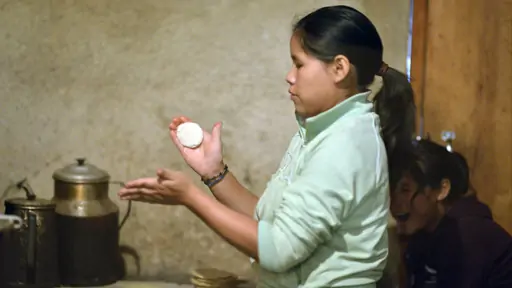Indigenous Calendar April, 2015: A Voice against Ixil Maya Genocide

The Guatemalan highlands are dense in forestation, fierce in terrain and inhospitable in climate. This is the main reason the area is, and always has been, sparsely populated. Yet their geographic location, geologic disposition and topographic makeup contributed a hindrance to the natural trade routes among the region's earliest inhabitants. Trade being as important as it is to human civilizations, it is not surprising that the area eventually became sedentary refuge for Mesoamerican indigenous people.
Among those people were the Ixil Maya who settled in the high Cuchumatanes mountains. While the Maya Empire around them was flourishing, they remained among the most isolated peoples in the Americas. Their situation remains largely unchanged today in the area known as the Ixil Triangle formed by the small towns of Santa Maria Nebaj, San Juan Cotzal, and San Gaspar Chajul. This isolation has kept their culture intact to a relatively large extent. Most Ixil people in this Triangle still speak the Ixil language and many still do not speak Spanish — centuries after the Spanish first arrived there.
In the 1970s their refuge became appealing to other Guatemalans for the same reasons that have kept it isolated. Guatemala was undergoing a civil war at that time and one of the main anti-government groups — the Ejército Guerrillero de los Pobres (Guerrilla Army of the Poor) — recognized the beneficial, strategic role that such an isolated area could play. They used it as an operational base.
What followed ranges from documented, historical fact to speculation that may never be proven or disproven. There should be no doubt, though, that while some Ixil would likely have been sympathetic to the army's cause, most would have been more concerned with basic survival. They had already survived for hundreds of years in the region. The military government at the time was suspicious of all the local Ixil people, many of whom were killed while others remain unaccounted for to this day. Just last July the remains of 31 Ixil, killed at the height of the civil war, were buried in the Triangle. Only 8 of those could be positively identified using the latest techniques of forensic science. Former Guatemalan dictator José Efraín Ríos Montt was found guilty of this and similar genocides two years ago. That verdict was immediately overturned and the re-trial was scheduled to start at the beginning of this year. It has been delayed — likely for months or longer — and is becoming as much of a circus as the war crimes tribunal recently did in Cambodia against the remaining Khmer Rouge leaders.
I was recently in the Ixil Triangle for a few days. In San Gaspar Chajul I ate lunch at one of the most basic eateries I've ever been in. This young woman was gracious enough to allow me to take a few photographs as she prepared the food I would be eating that day. I chose not to ask her about the Ríos Montt trial out of fear that my questions might upset her. Instead I chose to give her a voice.
All over the world there are people who just want to live their daily life, survive and avoid getting caught in the political crossfire in which they inadvertently find themselves. Increasingly we live in a world where our political "leaders" make that impossible.
Read more about the Ixil People.
The Ixil Maya are featured in our documentary, Ancient and Modern Mayan Peoples.
If you enjoyed reading this article, please consider supporting independent, advertising-free journalism by buying us a coffee to help us cover the cost of hosting our web site. Please click on the link or scan the QR code. Thanks!


